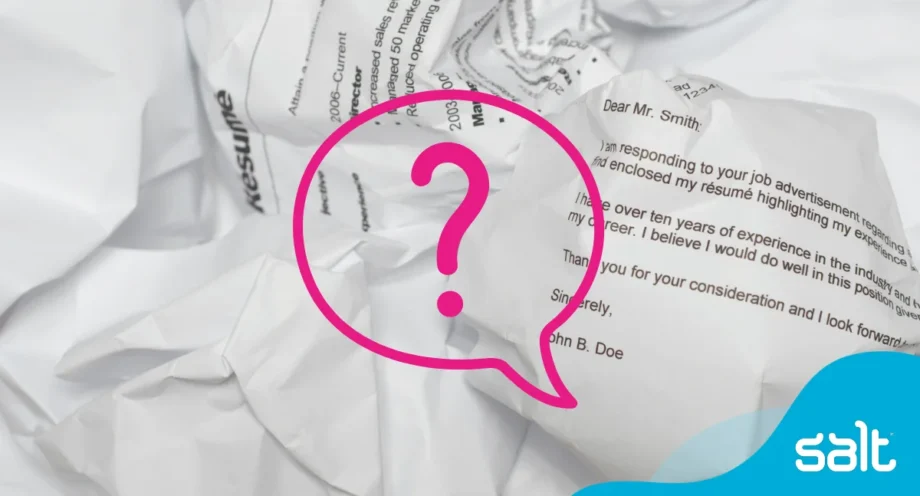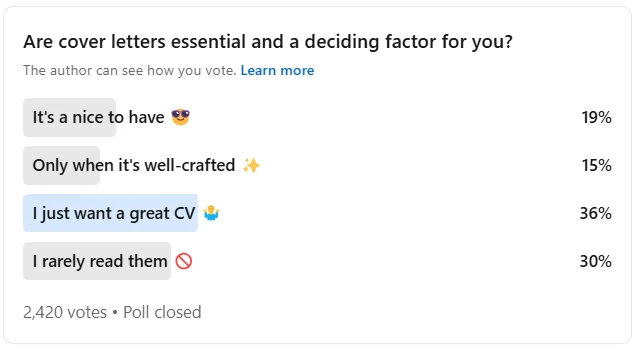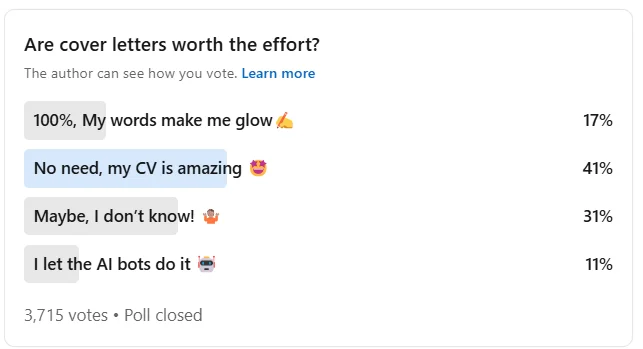Is a cover letter necessary? Our survey results might surprise you!
Is a cover letter necessary? We asked candidates and hiring managers worldwide to find out! Here's why and when to write a cover letter.

Every job seeker asks themselves if a cover letter is necessary at some point (or several points!) on their job seeking journey. Do employers really expect (and read) cover letters of applicants applying for jobs?
As a job seeker it’s only natural to start wondering if spending your time writing the perfect cover letter is worth it, especially if you’re applying to multiple roles. While some may argue it’s your chance to set yourself apart from the crowd, others insist they’re no longer relevant today.
“Do I really need to write a cover letter?” is a question we’ve often asked ourselves – and one that we’ve seen hotly debated over the last year! We ran our own polls to find out from real candidates and hiring managers worldwide if a cover letter is really necessary – and we were surprised by our results!
In this article we uncover the purpose of a cover letter, a few reasons why some recruiters and hiring managers still value cover letters today and those circumstances that you can skip writing one altogether!
What is a cover letter?
A cover letter, also known as a letter of motivation, is a letter you send along with your CV as part of your job application introducing yourself and asking them to consider your application. It’s normally just one page — or 3-5 paragraphs.
A cover letter introduces you in your own voice to the hiring manager, and is a chance to explain why you’re applying and why the skills and experiences in your CV will really add value at the company and in the role. It’s a great way to show recruiters or hiring managers that you’re the best candidate for the job and highlight reasons that may set you apart from other candidates applying.
Is a cover letter necessary?
Cover letters still play an important role in the recruitment process and for the most part are still deemed relevant.
Choosing to write a great cover letter gives you the space to elaborate on how your skill set and your previous work experience bring value to the role you’re applying for. There’s more space to tailor all the strengths and experiences listed on your CV to demonstrate how you meet their requirements for the role, as well as highlighting your unique learnings and value.
According to a recent study by Resume Genius, 78% of recruiters and hiring managers prefer applicants to submit a cover letter. While 25% of the 78% indicated a cover letter is ‘very important’ to them when deciding whether to invite an applicant for an interview or not. Just 6% of recruiters and hiring managers believed a cover letter is ‘not at all important’ when selecting candidates to interview.
However, we ran our own polls on LinkedIn to dig deeper into this question – and we found some surprising results!
CVs are more important than cover letters!
The results of our LinkedIn surveys in 2025 show that to both candidates and hiring managers, CVs are more important than cover letters!
Both hiring managers (36%) and candidates (41%) place more importance on CVs, not cover letters. 30% of hiring managers said they rarely even read cover letters! And 11% of candidates are already using AI to deal with the pesky task of writing a cover letter to accompany their resume.
With AI quickly becoming a favourite tool for job seekers, will the importance of a good cover letter continue to decrease as more candidates speed through the process of writing them? Based on our results, we think it’s likely! That said, to stand out for your dream role, a cover letter can still be a really useful way to distinguish yourself from the rest and show how much you care about your application.
If you are forgoing a cover letter, or writing one quickly from a template or with the help of AI, it’s doubly important your CV really shines.
Reasons to include a cover letter with your application!
While our data shows the answer to the question “is a cover letter necessary?” is no, it’s a tentative one! If you’re going for your dream job and you know competition is fierce, it’s another avenue to standing out from the crowd and really showcasing who you are early on in the application process!
It’s a chance to highlight your interest in the role
A cover letter gives you the opportunity to highlight your personal interest in the job role and what it means to you. An effective and well-written letter makes it clear that you are highly interested in the role, and why. It also shows the recruiter or hiring manager that you want the job enough to spend time crafting a personalised cover letter along with your application.
Share your personal story and achievements
Applicants can use their cover letter to share their unique story and focus on past accomplishments and work successes.
It’s common for recruiters and hiring managers to receive hundreds of applications for a popular role. While CV’s are a great way to highlight a candidate’s work experience and unique skill set, a cover letter is customised to highlight the specific value they feel they can bring to the role in question.
This also helps when recruiters and hiring managers have to sort through hopeful candidates applying for a role – placing their focus on the applicants who truly stand out from the rest, and who are more invested in the application process.
Build a relationship with your prospective employer
A cover letter is a great way to build a relationship with your prospective employer and allow them to see who you are and what your core values are.
While your CV presents the recruiter or hiring manager with facts about successful milestones in your previous positions, a cover letter will provide you with a chance to highlight why your accomplishments have such meaning to you, and what you’re looking for in a future position.
Explain a career gap on your CV
Cover letters offer the perfect opportunity to explain a career gap on your CV. In most cases there are reasonable explanations as to why there is a period of time spent out of work or between roles. This could be a result of ill health, maternity leave, travelling or any other personal reasons. A cover letter can be a great way used to help explain any missing periods on your resume and take ownership of your own story.
Reasons not to include a cover letter with your application!
Is a cover letter necessary to send with all job applications? Our results show that 29% of hiring managers rarely read cover letters, and 37% just want a great CV.
Even if a cover letter is required in your application, depending on the time you have, the number of applications you’re doing, and the importance of the application to you, writing something short pointing to your CV or forgoing a cover letter altogether likely won’t be the deciding factor if your resume really showcases you as the best candidate for the job!
There are also a few instances where you shouldn’t include one:
When the job application states it doesn’t require one
If the job application specifically states that you don’t need to include a cover letter, then it’s definitely best to follow their instructions when submitting your resume for the role.
When you are pressed for time
No cover letter is much better than a poorly written one. Our results show that 15% of hiring managers are only interested in ‘well-crafted’ cover letters – so if you’re short on time and they’re optional it might be worth skipping it altogether!
A poorly written or rushed cover letter might negatively influence your job application. We recommend only submitting a well-composed cover letter that you have time to customise for the position you are applying for.
When there is no place to upload one on the application platform
In some cases a company may advertise for an open role on an online platform that doesn’t allow for the option to attach a cover letter. If this is the case, consider it a sign that the company feels a cover letter is not required.




